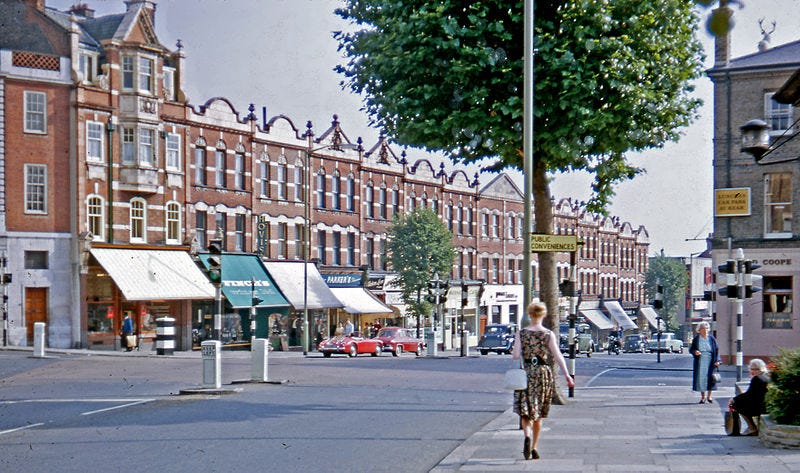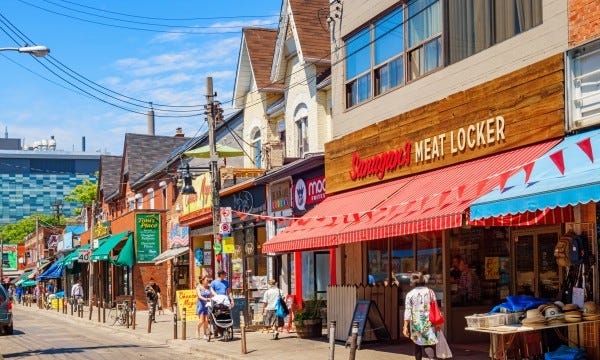The Endgame
Newsletter #34 - Exit greeters
Port Medway, Nova Scotia, August 11, 2023
Exit greeters
When I was a kid in England my mother used to shop every two or three days on Finchley High Road in London, near where we lived. She’d go to the usual places—the butcher, greengrocer, bakery, chemist, off-licence, etc.—to get what our family needed. Shopping like this was an important and pleasant part of a certain way of life. This was in the early 1950s.
Today my wife Cynthia and I shop every two or three days on College Street and in Kensington Market in Toronto, near where we live for most of the year. We go to the usual places—the butcher, greengrocer, bakery, pharmacy, wine store, etc. It’s not much different from the way my mother shopped on Finchley High Road seventy years ago.
A few days ago I had quite a different kind of shopping experience. We went to a Costco in Nova Scotia (we spend most of the summer in Nova Scotia). Costco is about as far as you can get from Finchley High Road in London, or Kensington Market in Toronto. I’d never been to one before.
A Costco store is gigantic, often close to 200,000 square feet. There’s a huge array of goods for sale under one roof—groceries, household cleaning and paper products, snacks, meat, seafood, automotive parts and tires, socks and underwear, appliances, luggage, electronics, hearing aids, funeral caskets, furniture, jewellery, pet supplies, toys, and on it goes. (Although, interestingly, a Costco store typically stocks far fewer items than the average supermarket.) Determined shoppers rumble around the aisles filling up ultra-large shopping carts. Stores are busy: at peak times people queue to get in.
Most of what Costco sells is packaged in big quantities. You don’t go there for just one of this or one of that, a single jar of pickles or one box of tissues. A friend of mine that I was visiting in British Columbia a while back went to Costco to pick up some lamb chops for our supper and came back with a pack of 72 chops. “There’s only two of us,” I said. “It was a good deal,” he said. “I can always freeze them.” Costco’s best-selling item worldwide is toilet paper—it sells more than a billion rolls a year. Rotisserie chicken is in second place—about 120 million chickens a year.
Are big-box stores magnificent expressions of capitalism, cathedrals of commerce? Should we admire and praise their extraordinary efficiency, superb supply chains, excellent inventory management, splendid cost controls, brilliant sensitivity to consumers’ likes and needs?
Or are they dystopian? Are they Dante’s Fourth Circle of Hell, encouraging greed and materialism, getting us to buy goods we don’t need, denying us the human and humanizing contact we need, and once found, on the shopping high street?
When you leave a Costco store you encounter someone they call an “exit greeter.” The exit greeter checks your receipt and eyeballs your shopping cart, I suppose to get some assurance that you’ve paid for what you’re taking. (Costco disingenuously says one function of the greeter is to make sure the customer has not been overcharged.) Greeters also smile—that’s the “greeting” part, I guess. I just wish they were not called “exit greeters.” How can you greet someone who’s walking out the door?
Maybe we should all have an exit greeter as we leave life, someone who will check that during our time on earth we’ve paid the right price, but also that we have not been overcharged, someone who will smile and wave goodbye as we walk out the door forever.





Ha ha, thanks for putting a fun spin and making us think about the exit greeter concept 🤣 Having also grown up in Europe, I'm not a big fan of the Costco shopping experience. There are no clocks or windows, and you are suspended in time just like in a casino with the same sad and frenzied energy in the air. Not my cup of tea!
If only we had a high street within walking distance! I blame the car. On the other hand I love the car. Life is so complex.